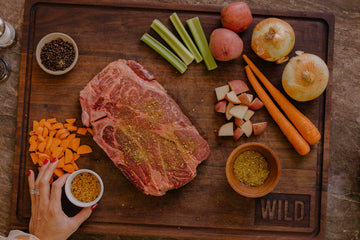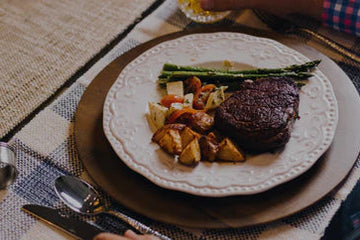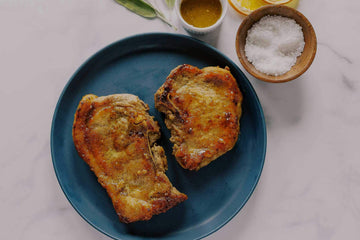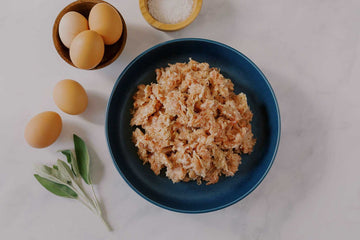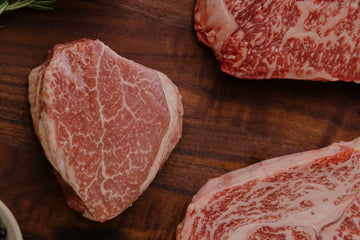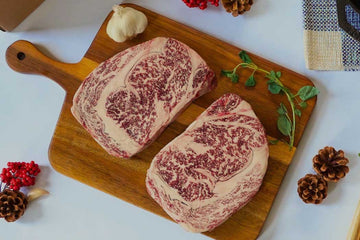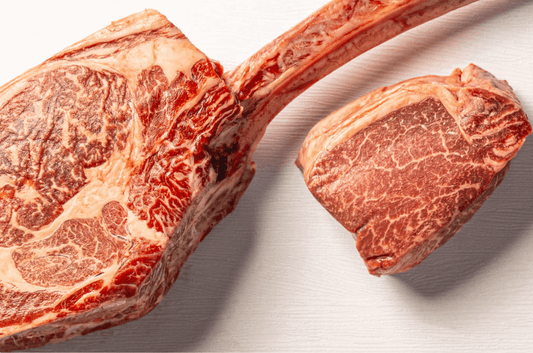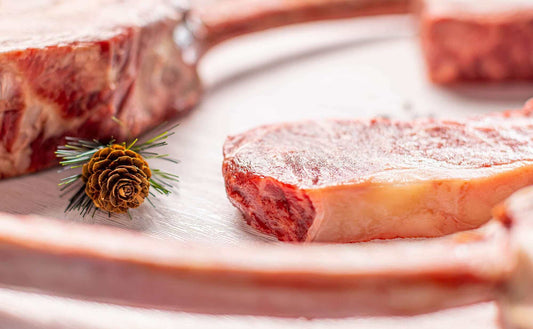Field Notes From the Farm
Blog
Is Wagyu Beef Healthy?
We’ve all heard the saying, “you are what you eat.” But if your new year’s resolutions have you a little less than enthused about what food is considered “healthy”, we have great news: Wagyu has numerous health benefits! These prime cuts are more than just a pretty face (although the marbling can’t be beat!) - they bring in some major nutritional advantages when compared to grocery store beef. Here’s what Wilders Wagyu can do for you:
1. Wagyu Beef Fat Content
News flash: not all fat is bad! The “good” stuff is in monounsaturated and polyunsaturated fats, which lower the risk of disease. “Bad fats” are found in trans fats, which get the bad rap for disease risk, weight gain, etc. While Wagyu beef contains more intramuscular fat, it does not contain the unhealthy fatty acids. The ratio of n-6 and n-3 fatty acids are lower in Wagyu. These fatty acids found in conventional beef are associated with inflammation, as opposed to the healthier fats found in Wagyu beef.
2. CLA Omega-6 Fatty Acids
Wagyu is also known for being a great source of conjugated linoleic acid, or “CLA.” This omega-6 fatty acid is known for numerous health benefits, such as reduced body fat, improved muscle mass, and lowered disease risk"CLA may lower cholesterol levels, reduce the risk of certain cancer and reduce the risk for Alzheimer's disease, although more research is needed in this area," says Andrew Akhaphong, RD, LD, a dietitian for Mackenthun's Fine Foods. A review in Public Health Nutrition also noted that eating foods with CLA can help to lower LDL cholesterol levels, often referred to as "bad cholesterol" for heart health.
3. Oleic Acid
But wait, there’s more! Wagyu is also a good source of oleic acid, which the FDA stated, “may reduce the risk of coronary heart disease.” This fatty acid is found in olive oil, and is one of the major contributors to the health benefits associated with using olive oil, such as benefits to autoimmune and inflammatory diseases. It is also known to reduce cholesterol, increase healthy blood vessel function, and assist with the immune system.
4. Sustainable Practices
In addition to the naturally occurring nutritional properties of Fullblood Wagyu, Wilders takes it a step further. We are committed to offering a product as close to nature as possible. We raise our cattle with no added growth hormones or steroids.
That also means sourcing local, sustainable goods that fuel not only our animals, but the planet. We grow and harvest the hay and silage that we use to feed our animals. And if we choose to feed other grain and commodities, they are sourced from local NC farmers. The nutrition program that our beef animals are on is a total mixed ration that is very highly studied and is an exact science of the protein and nutrients that those animals need, no more no less.
Buy some Wagyu today!
Curious where all this data came from? Check out our sources:
Composition of Wagyu Fat and its Health Benefits
Wagyu Beef Nutrition: Health Benefits, Risks, and How to Cook It
National Library of Medicine: Association of Foods Enriched in CLA
FDA Review of Oleic Acid and Risk of Coronary Heart Disease
Impact of Beef Consumption on Saturated Fat
How to Cook A 100% Fullblood Wagyu Beef Roast for the Holidays
Featured Meat: Pasture-Raised Beef Roast
A classic for the holidays! Our pasture-raised beef roasts are mouth-watering and fork-tender. They're best cooked low and slow, accompanied by some carrots, potatoes, and herbs. Enjoy!
Click here to shop our beef roasts.
Cooking Tips
If you're making that special holiday meal with Wilders pasture-raised beef, you're already off to a great start! Take your mouth-watering, flavor-packed roast to the next level with some simple best practices from our favorite local chefs:
1. Seasoning
There's a reason for the saying "goes together like salt and pepper" - this classic combination is all you need for a perfect Wilders roast! Season generously to pull out all that juicy marbling.
2. Searing
Now that you've got all of those flavors popping, lock them in! Whether you're roasting in a pan, dutch oven, or crock pot, always sear the meat. You don't want to lose any of those mouth watering juices in the cooking process.
3. Roasting
It's choose your own adventure here, as long as you do it low and slow! Crock pot, instant pot, dutch oven, roasting pan - they all work and it's mostly a matter of preference. Don't forget to add in some onion, garlic, and your favorite roasting veggies.
Check out our shop for all of your 100% Fullblood Wagyu beef and Berkshire pork!
What Makes Meat Marble?
Do you want to know a secret? The key to a good steak is meat marbling.
Wagyu vs. Angus Beef: What's the Difference
What’s the difference between Wagyu and Angus beef? You might notice the price difference, but there’s a lot more than meets the eye when it comes to steak quality.
Wagyu beef is Wagyu (translated “Japanese cow”) is a Japanese cattle breed. Larger and stronger than other American cattle breeds, they are known for having more fat marbling woven throughout their muscle. This fat-to-meat balance produces a highly sought-after steak that is more tender, juicy, and rich compared to other steaks.
Angus originates in Scotland, and is highly popular in the U.S. They can be found in either Black Angus or Red Angus varieties, and are ranked in quality tiers, the highest of which are Prime or Choice Certified Angus.
The biggest difference between the two is the marbling, which is the little white flecks of fat throughout the meat. The ratio, volume, and placement of those fat strands determines the texture, taste, and over all quality experience of the steak. Wagyu will produce a richer, more buttery, highly marbled cut with flavorful fat strands throughout. This marbling results in a much higher quality and taste.
Another significant difference is how they are often raised. Commercial angus cattle are typically raised in high quantities for high volume production. Wagyu, on the other hand, are typically raised in smaller quantities, prioritizing a low to no-stress environment to produce a higher quality product.
Check out our shop for all of your Wagyu beef and Berkshire pork needs!
What is 100% Fullblood Wagyu Beef?
So you've stumbled upon 100% Fullblood Wagyu steaks and want to know what makes them so good (and so expensive!) If there's anything to know about this highly sought-after prime cut, it's quality over quantity.
Wagyu (translated “Japanese cow”) is a Japanese cattle breed. Larger and stronger than other American cattle breeds, they are known for having more fat marbling woven throughout their muscle. This fat-to-meat balance produces a highly sought-after steak that is more tender, juicy, and rich than other steak.
100% Full-blood Wagyu
Wilders serves only 100% Fullblood Japanese Wagyu. This pure-bred variety means our Wagyu beef is not mixed with any other varieties, unlike American Wagyu Beef, which combines purebred wagyu with traditional cattle.
Pasture-Raised Wagyu Marbling
You’ll notice that 100% Fullblood Wagyu has a richness that is unmatched in any other steak. This is due to the exceptionally high distribution of fat, or marbling, throughout the steak. Most people note a buttery, or even sweet taste, compared to commercial beef.
Check out our shop for all of your 100% Fullblood Wagyu Beef and Berkshire pork!

